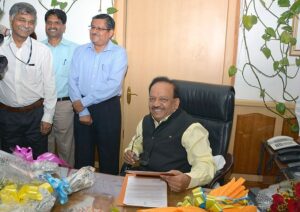![Ayushman Bharat expansion architects pictured. Union Health Minister Dr Harsh Vardhan and Prime Minister Narendra Modi. Image credit: Prime Minister's Office (GODL-India) [GODL-India (https://data.gov.in/sites/default/files/Gazette_Notification_OGDL.pdf)]](/wp-content/uploads/2019/05/800px-thumbnail-4-768x450.jpg)
“The victory, he said, was not his, but that of the beemar vyakti’ (ailing person), who was unable to afford medical treatment for several years and has now been able to do so under the NDA government,” Health Issues India reported in the wake of the National Democratic Alliance’s victory. Indeed, the saffron wave Modi rode to a second term as Prime Minister provided him a mandate for his government’s healthcare agenda – at the top of which sits the Pradhan Mantri Jan Arogya Yojana (PMJAY), better known as ‘Modicare’ or Ayushman Bharat.
The initiative, regularly touted as the largest of its kind in the world, offers health insurance coverage of up to Rs 5 lakh per family per year. Beneficiaries at present are among the fifty crore economically vulnerable Indians making up some 37 percent of the total population. However, with the NDA returned to the Government, plans are underway to effect a significant expansion which will broaden Ayushman Bharat’s scope to cover 75 percent of the population – approximately a billion people.

“The first 200 days of Ayushman Bharat…saw twenty lakh Indians covered under the provisions of the scheme. This figure has since increased to 27 lakh Indians according to Nadda’s successor as Health Minister, Dr Harsh Vardhan.”
This ambitious target may appear, on the face of it, implausible. However, it is important to look at how this would come about. The planned expansion would see existing health insurance coverage schemes at the state and central levels merged to become a singular entity under the umbrella of Ayushman Bharat, according to a report published today in The Print.
Quoting an anonymous official from the Union Ministry of Health and Family Welfare, the publication reported that “central government-run schemes such as Rashtriya Swasthya Bima Yojana (RSBY), Central Government Health Scheme (CGHS), Employees’ State Insurance (ESI), Ex-servicemen Contributory Health Scheme (ECHS) and the railways health scheme are likely to be merged under the Ayushman Bharat by the end of this year.”
In addition, the official said, some state governments had proposed merging their own initiatives with Ayushman Bharat. Maharashtra and Tamil Nadu are among the states where this could be the case.
As the Lok Sabha polls began, the Centre was keen to tout the progress made under Ayushman Bharat. According to then-Union Minister of Health and Family Welfare J. P. Nadda, the first 200 days of Ayushman Bharat (launched in September) saw twenty lakh Indians covered under the provisions of the scheme. This figure has since increased to 27 lakh Indians according to Nadda’s successor as Health Minister, Dr Harsh Vardhan.

“Concerns have regularly been expressed about the financing of the scheme and whether it can be funded sustainably on a long-term basis. Economists raised such concerns during a government consultation. Meanwhile, doctors have said that the scheme merely diverts money from the public to the private sector.”
Ayushman Bharat has far from received universal acclaim since its launch or even since its announcement. Experts interviewed by Health Issues India during the election expressed misgivings.
It was expressed that “the government’s health insurance scheme has diluted the primary healthcare sector and is seen to provide insurance without adequate support structure on the supply side. Since the scheme is not accompanied by any significant public expenditure for modernising public health infrastructure the requirement to meet the additional demand will be restricted to the private sector and would end up escalating cost.”
Concerns have regularly been expressed about the financing of the scheme and whether it can be funded sustainably on a long-term basis. Economists raised such concerns during a government consultation. Meanwhile, doctors have said that the scheme merely diverts money from the public to the private sector.

“Dr Vardhan has asserted strengthening and implementing Ayushman Bharat and encouraging greater uptake among the citizenry to be his main priority, including in the states which have rejected it.”
The scheme was strongly criticised by Congress leader Rahul Gandhi on the campaign trail, denigrating it as a “handout to the fifteen to twenty richest businessmen in India” which “[targets a] very limited number of healthcare issues.” Political opposition has gone beyond election rhetoric. Some state governments such as in Delhi and West Bengal have actively repudiated Ayushman Bharat in favour of their own health-centred initiatives.
Nonetheless, with the NDA again installed in government and Modi in the Prime Minister’s chair, Ayushman Bharat will not be stricken from the government’s healthcare agenda any time soon. Dr Vardhan has asserted strengthening and implementing Ayushman Bharat and encouraging greater uptake among the citizenry to be his main priority, including in the states which have rejected it.
“Since Ayushman Bharat was implemented around 27 lakh people have availed the benefits under the scheme,” Dr Vardhan said on his first day in office. “However, still five states – Delhi, Odisha, Telangana, Andhra Pradesh, and West Bengal [have] not implemented the scheme. Firstly, I would personally call the chief ministers of the states and I will convince them to join the scheme.
“Still many people are not aware of the scheme and some of them who are in dire need of the benefits provided under the insurance scheme are not able to avail it due to eligibility criteria issues. These [issues] will be given top priority.”

